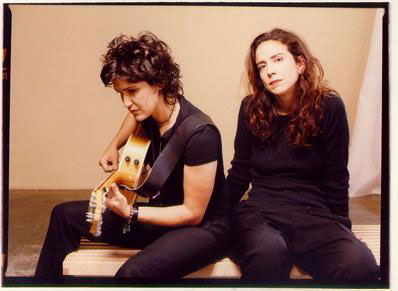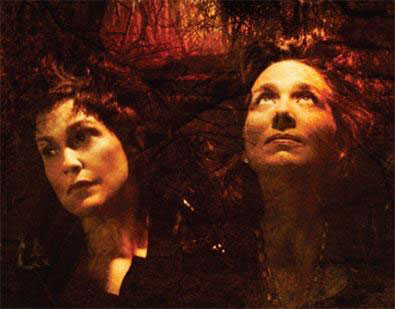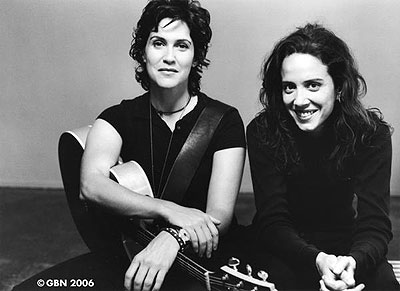Sometimes It Snows In April: In Praise of Wendy & Lisa
Published on March 30th, 2011 in: Back Off Man I'm A Feminist, Feminism, Issues, LGBTQ, Music |By Paul Casey

Photo from Wendy & Lisa’s MySpace page
When Prince fired Wendy & Lisa in 1986, the most significant writing partnership in that precious little Minnesotan’s career left with them. Not only are Wendy & Lisa credited as co-writers on many classic Prince and the Revolution songs—including “Sometimes It Snows In April,” “Computer Blue,” and “Mountains”—their influence on popular music of the past 30 years is considerable, extending to associated artists, like The Time and Apollonia 6. As well as producing five albums since leaving The Revolution, the duo has written scores for the television show Heroes and currently, Showtime’s Nurse Jackie.
In addition, Wendy & Lisa’s soft, mature approach to their sexuality, especially following The Revolution, mark them as two of the more inspiring musical figures to resonate with the LGBT community.
When Lisa Coleman joined Prince’s backing group in 1980, she brought to his studio album Dirty Mind the first voice other than his own to express such terribly filthy thoughts. The daughter of session musician Gary Coleman, she was brought in to replace keyboardist Gayle Chapman. Depending on whom you ask, Chapman left the group either because of the increasingly explicit direction that Prince was taking in the late ’70s, or because of a more general dissatisfaction with the direction of her career. The role of the virgin bride on “Head” was initially meant to be filled by Chapman so it’s easy to speculate that this tale of pre-marital befouling may have conflicted with her Christian beliefs. There is more than a touch of irony here, considering Prince’s progression from the man who sincerely wanted to “fuck the taste out of your mouth,” into the hypocritical arse who admonishes his audience for swearing.
In Lisa Coleman, Prince found someone who was not shy about expressing her sexuality. From her first intonations on “Head” to her pairing with Prince’s protégé Jill Jones on 1999, Lisa made it clear that she had no qualms with keeping up with Prince’s musical libido. Wendy Melvoin arrived in 1983 and performed with the group live for the first time at the famous Minneapolis club First Avenue. This performance produced the recording of “Purple Rain” and saw the beginning of The Revolution as an entity onto itself. Lisa had already made a contribution, co-writing “The Stick” on The Time’s debut album, but it was with Wendy that The Revolution would begin.
Wendy was Lisa’s childhood friend and also her lover. Prince—having walked the line of ambiguous sexuality ever since he first straddled a unicorn on the back cover of 1979’s self-titled album—saw a chance to further expand his Sly Stone inspired freaky family. As Wendy & Lisa explained in an interview with Out magazine in 2008:
Lisa: With Prince and the Revolution, I think that it was just taken for granted that we were supposed to be the gay reps in the band. The blacks, the whites, the gays. And people would say, “Gee, do you think this lesbian thing is going to work for them?
Wendy: He (Prince) was incredibly conscious about it. That guy wanted fans. So any way he could get them—and a more interesting way he could do it—appealed to him.
Lisa: We had a photo shoot for the Purple Rain poster. We were all in our different positions and he at one point walked over to me and Wendy and lifted my arm up and put my hand around Wendy’s waist and said, “There.” And that is the poster. That’s how precise he was about how he wanted the image of the band to be. He wanted it to be way more obvious. We weren’t just the two girls in the band. We were the gay girls in the band. It was very calculated.
It would be unfair to suggest that this was all Prince saw when he added Wendy to his group since she was clearly an accomplished guitarist. While the fictionalized history of the band, as seen in the film Purple Rain, overemphasized the contribution Wendy & Lisa made to the title track, the opening chords were Wendy’s. What’s more important though, was how Prince had found a partnership—and friendship—that gave him much needed feedback from people he trusted and respected.
Following the exit of Wendy & Lisa, it can be seen—through the excess of his material and a seemingly complete unawareness of quality control—that they did far more for Prince than play the lesbian couple. From the beginning of The Revolution in 1983 to their break-up in 1986, Prince recorded four albums with the group. Purple Rain, his most successful, was also a hit movie, which won Prince and the group an Academy Award for Best Original Song Score. Purple Rain is an album of near unrivaled quality and displays Prince at the very height of his talent.

Photo from Wendy & Lisa’s MySpace page
Around the World In a Day, released ten months later, was less successful, but featured a distinctive shift in musical style. The hit single, “Raspberry Beret,” “Paisley Park” (the song which debuted the studio), and the sweet as all hell, “Pop Life,” all showed the influence of Wendy & Lisa’s musical sensibilities. Lisa’s brother David also played on the album, co-writing the title track with Prince. David died in 2004 from an enlarged heart. Lisa wrote the following for David’s biography:
“One of David’s languages of choice was music. He was a true multi-instrumentalist his whole life. He could pick anything up and make music with it. But to limit household fights we divvied up the gear . . . he was mainly a cellist and drummer/percussionist, oh and bass player. And yeah, really a great guitar player, and of course the OUD! Which was a key signature sound on Around The World In A Day 1985, Prince and the Revolution, which was written by DAVID and PRINCE. Oh yeah . . . and finger cymbals!”
—From the Gary Coleman website
The underappreciated “America,” co-written by the duo, reignited the passionate, though confused pseudo-politics of Dirty Mind‘s “Partyup.” Parade, like Purple Rain, was the soundtrack to a movie, but this time Prince took the Director’s chair. The mostly entertaining (though creatively misjudged by Prince) Under the Cherry Moon was a comedy of sorts, stunningly shot in black and white by frequent Scorsese cinematographer, Michael Ballhaus. Whereas Purple Rain, while flawed, was acclaimed for its energetic performances, Under the Cherry Moon only featured The Revolution in the closing credits.
This was about the time that it became apparent that Prince was having second thoughts on the integral, almost symbiotic, relationship which he and Wendy & Lisa had developed. Not only were the group shut out of the film, there was seemingly an attempt on Prince’s behalf to mislead the public on their role in recording the album. Although Melvoin and Coleman were responsible for co-writing two of the main songs on Parade—”Mountains” and “Sometimes It Snows In April”—nowhere are their names acknowledged in the credits to the album. Instead, an all encompassing, “Written, Produced, Arranged and Performed By Prince and the Revolution” takes the place of individual credits. John L. Nelson, Prince’s father, does however receive individual credit, in spite of the somewhat dubious contribution he made.
Dream Factory, the final Revolution album, was recorded and assembled prior to Prince delivering the typically curt, “I’m gonna have to fire you,” in ’86. Featuring some songs which would turn up on 1987’s Sign ‘O’ The Times, it included an even more prominent place for Wendy & Lisa, as well as Wendy’s sister, Susannah, with whom Prince was romantically linked. Susannah had been featured on the album and tour for Parade, as well as being a part of Prince’s side-project, The Family. Along with co-lead vocals on “A Place In Heaven,” their backing vocals cover the album. An intriguing, slowed down Revolution version of “Strange Relationship” is a highlight.
Wendy & Lisa’s skills were also highlighted on two instrumental tracks. “Visions” opens Dream Factory with Lisa playing a solo piece on piano. This eventually saw official release on a bonus CD for their 1990 album Eroica. Similar in tone was a song called “Carousel,” written by Wendy & Lisa. Prince liked the song, re-wrote the lyrics, and recorded it with the band in one take as “Power Fantastic,” during the Dream Factory sessions. Wendy showcases her guitar playing on “Interlude” leading into the classic “I Could Never Take the Place Of Your Man.”
It is likely that the movement away from the self-contained, “I played all instruments on this album” Prince of 1979, and Wendy & Lisa’s growing talent and influence on his sound, was his reasoning for dissolving the group. Following the break-up, which left the sublime Dream Factory unreleased, Wendy & Lisa put out two LPs with Columbia records: Wendy & Lisa and Fruit At The Bottom. Wendy & Lisa, released in 1987, is a full length outing for the kind of addictive pop that had made Around the World in a Day and Parade so memorable. As well as featuring sad and beautiful love songs from the same stock as “Sometimes It Snows In April” like “Stay,” the album is preoccupied with the disbanding of The Revolution. “Song About” expresses the confusion and loss that Wendy, Lisa, and drummer Bobby Z felt in the wake of the end. “Everything But You” addresses Prince and the conflicted feelings they had for each other.
Fruit At the Bottom saw a turn towards a harder, funkier sound. “Are You My Baby” and “Satisfaction” showed a pleasing extension of the Parade sound, and proved that Wendy & Lisa did not require the Purple One to dabble in the funk. The lead single, “Lolly, Lolly” was remixed by Prince, the only time that he contributed anything to the recording career of his former bandmates. “Tears of Joy” moves, just as “Stay” did, with meditative, mournful sounds.
Unsure of which niche in which to put Wendy & Lisa, Columbia dropped them, leading to the pair releasing their third album, Eroica, on Virgin Records. Eroica, while more acoustic and contemplative, is in keeping with the tone of Fruit At the Bottom. “Skeleton Key” features the work of Prince staple Eric Leeds, who injects some horn-based funk into the proceedings. Songs like “Valley Vista” and “Mother of Pearl” signpost the work that the two would do with Crowded House founder Neil Finn on the quite excellent One Nil.

Photo from Wendy & Lisa’s MySpace page
As it happened, Virgin did not know what to do with Wendy & Lisa any more than Columbia did. Apart from a botched session with Buggles front man and producer, Trevor Horn, the two did not release an album until Girl Bros in 1998. Girl Bros is far more downbeat than their previous work, owing in no small part to the death of Wendy’s brother Jonathan, in 1996. “Jonathan,” is a stunning, personal, evocation of the loss of a loved one. With a guitar part that recalls “Wish You Were Here,” by Pink Floyd, a synth organ bubbles under perhaps the greatest single vocal on a Wendy & Lisa album. Closing out the LP is a delightfully bizarre cover of Pinocchio’s “I’ve Got No Strings,” which makes one think that an entire synth-pop reinterpretation of Disney’s catalogue would be a good thing.
It would be another decade until we were treated to an album by the Girl Bros. 2008’s White Flags of Winter’s Chimneys—taken from the Joni Mitchell song “Hejira”—is even more hypnotic and ambient than its predecessor. Both Wendy & Lisa deliver vocals that are more thoughtful and powerful in their whispers, than they ever were in high-energy mode. From the dream-like opener “Balloon” to the closing moments of “Sweet Suite,” this is an album to rival any in their catalogue. I hope that it will not be another ten years before we see an album from them.
What Wendy & Lisa define, to me, apart from their sizable musical talent, is personal credibility. Unlike their collaborator Prince—who turned his back on not only his friends, but also his own stated beliefs—Wendy & Lisa kept their cool. They did not “come out” until 2008. They were never really “in the closet,” though. Their sexuality was personal. Their love was personal. And that is something that Wendy & Lisa expressed which Prince never could. That homosexuality is not just sex. It’s love. Every one of those beautiful songs which they wrote, from “Stay” to “Tears of Joy” to “Let’s Say,” give us something that every tawdry “Bambi” cannot take away. That people are people, and love is love. Prince may have known that once. He does no longer.
From The Minneapolis Star Tribune‘s “Prince: An Oral History” in 2004:
Wendy: We tried to put together a Revolution reunion tour in 2000, and he declined because of my homosexuality and the fact I’m half-Jewish. It came back: Go have a press conference denouncing your homosexuality and that you’re converting to Jehovah. I was like: I guess we’ll never hear from him again. And I had to kind of mourn him. It was devastating to think we’ve kind of lost him.
May we never lose Wendy & Lisa.
For more on Wendy & Lisa, please visit their website.
Time limit is exhausted. Please reload the CAPTCHA.